When the question arises about reliable and long-term contraception, it is impossible to ignore the hormonal birth control pills.
Already the very definition of the concept of hormonal pills in many women causes a number of unpleasant associations with overweight, unwanted facial hair and infertility.
Such myths have been around for more than half a century and are associated with the side effects of the first contraceptive pills, which contained a large dose of hormones.
Since then, advances in medicine in terms of contraception have leaped forward, and new ones have hormonal pills, in which hormones were one hundred times smaller, were the reason for dispelling the erroneous opinion about the dangers of such a method of preventing unplanned pregnancy.
What are the new generation hormonal contraceptives
One active hormone pill is a combination of two female hormones - estrogen and progestogen. From the point of view of physiology, these biological substances are natural for the female body, and their predominance depends on the phase of the menstrual cycle.
How do pills help prevent unwanted pregnancy
The active ingredients of the tablet inhibit the production of gonadotropic hormones, which the pituitary gland secretes. This prevents the maturation and release of the egg, resulting in ovulation becomes impossible. If there is no egg in the body, fertilization will not occur and there will be no pregnancy.
In addition to the direct anovulatory effect, hormones increase the density of the mucus of the cervical canal, the natural barrier to sperm and bacteria, change the inner layer of the uterus so that the attachment of a fertilized egg becomes impracticable. In addition, sperm cells become less active, which also enhances the contraceptive effect of the drug.
Types of low hormone pills
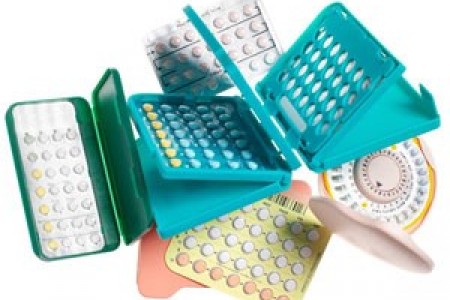
Conventionally, hormonal contraceptives can be divided into two groups: those containing estrogen and progestogen, and those that consist of progestogen.
Combined oral contraceptives (COC) by the amount of estrogenic hormones are:
- low dose (contain 30-35 µg of ethinyl estradiol);
- microdose (as a part of 20 mkg and less ethinylestradiol).
Consider in more detail the microdose CECs, because it is precisely this group that gynecologists prefer. Depending on the ratio of estrogen and progestogen in the tablet are monophasic, biphasic and triphasic drugs.
What gives the use of low-level COC
The positive aspects of the use of pills with a low content of hormones relate not only to the prevention of abortion, but also the impact on women's health. Research has proven the following benefits of COC:
- High protection against unwanted pregnancy. When properly applied, it is 97-98%.
- Fast contraceptive effect from the beginning of the reception.
- The method is not directly related to sexual intercourse.
- Suitable for long-term contraception and does not require taking breaks in use.
- The woman herself can stop using the method as soon as she decides to become pregnant.
- Unwanted side effects occur rarely and for a short time.
- Skin condition improves.
- Premenstrual syndrome is more easily tolerated.
- Monthly become regular, painless, blood loss decreases.
- Prevent the occurrence of malignant tumors of the endometrium, rectum and ovaries.
- 40% reduce the likelihood of benign breast diseases.
- At 90% protect against ectopic pregnancy compared with other methods of contraception, including sterilization.
- Reduces the risk of ovarian cysts and dysfunctional uterine bleeding.
The negative side of hormonal contraception

Unfortunately, the hormonal method is not suitable for absolutely all women, and the reason for this is the presence of contraindications, a number side effects and some drawbacks of the method.
If you open any instructions for any low-dose oral contraceptive, you will see a whole section dedicated to this issue.
- suspected pregnancy;
- lactation;
- severe liver and gallbladder disease;
- vaginal bleeding with an unexplained cause;
- circulatory disorders in existence or any prescription associated with deep vein thrombosis, coronary artery disease, stroke or pulmonary thromboembolism;
- blood pressure is higher than 140/90 mm Hg. v .;
- existing bleeding disorders;
- diabetes with severe complications;
- breast cancer;
- autoimmune diseases;
- migraine and focal neurological symptoms.
According to reviews of women who took hormonal birth control pills, they had side effects, manifested by the absence of menstruation, vomiting, dizziness, smear, headaches, decreased sexual desire, frequent mood swings. Despite the positive effect of hormones on the skin, in some cases there were complaints about the opposite effect.
A hormonal contraceptive method cannot protect you from sexually transmitted infections and HIV, so in circumstances where there is a risk of contracting sexually transmitted diseases, you must use a condom.
Who may be protected by low-level COC
The body of each woman is unique in its own way, and there is no universal preparation suitable for absolutely everyone. But if you summarize the indications for using this method of contraception, it can be recommended to all women of reproductive age, regardless of whether there is a birth or abortion in history. It is advisable in the presence of an active sex life (at least once a week) and a permanent sexual partner.
The use of hormonal contraception will benefit women with irregular periods, those with critical days accompanied by severe pain and heavy bleeding, leading to anemia.
It can be used in the postpartum period, provided that the woman does not breastfeed the baby and more than 21 days have passed since the day of birth. In the post-abortion period, the first pill is taken immediately on the day of surgery.
The protection of COCs with a minimally low hormone content is practiced in women over 40 years old, with thyroid diseases and benign tumors of the genitals and breasts.
What can prevent the use of birth control pills?

Even if we assume that the body is ideally suited for hormonal contraception, there are several reasons why the use of drugs can be difficult.
- Firstly, responsible and disciplined pills. It is necessary every day at the same time not to forget to drink the remedy, otherwise there will be no contraceptive effect.
- Secondly, limited financial capacity. The price of tablets with a minimum hormone content per one cycle ranges from 430 to 1140 rubles. Considering that it is necessary to replenish the supply of contraceptives every month, this reason most often serves as a reason for refusing hormonal contraception.
- Thirdly, drugs for the treatment of tuberculosis, anticonvulsants and antidepressants based on Hypericum extract reduce the contraceptive ability of hormonal pills. Do not forget to tell the gynecologist about this if you are undergoing treatment with these drugs.
Taking antibiotics from the tetracycline group and penicillin also has a negative effect on the contraceptive effect of hormones. In such a situation, to prevent pregnancy, it will be necessary to additionally use a condom or spermicide during treatment and another week after it.
List of modern birth control pills with the lowest amount of hormones
In the list below, you can familiarize yourself with widely used contraceptive pills with a low content of hormones (name, manufacturer, estimated price, composition).
- Zoeli. Manufacturer - Ireland. Cost - 985-1140 p. Ingredients: nomegestrol acetate 2.5 mg, estradiol hemihydrate 1.55 mg.
- "Jess." Manufacturer - Germany. Cost - 938-981 p. Ingredients: ethinyl estradiol 0.02 mg, drospirenone 3 mg.
- "Jess Plus." Manufacturer - Germany. Cost - 960-1020 p. Ingredients: ethinyl estradiol 0.02 mg, drospirenone 3 mg, calcium levofefolat 0.451 mg.
- "Median". Manufacturer - Hungary. Cost - 620-800 p. Ingredients: ethinyl estradiol 0.03 mg, drospirenone 3 mg.
- "Lindinet 20". Manufacturer - Hungary. Cost - 355-465 p. Ingredients: ethinyl estradiol 0.02 mg, gestodene 0.075 mg.
Note: In Zoeli, the progestogen chemical formula is derived from natural progesterone, which is better tolerated by the body.
The presence of drospirenone provides antiandrogenic effect, which consists in reducing the number of acne, oily hair and skin, the accumulation of excess fluid in the body.
Calcium levomefolat is a biologically active form of folic acid. It is needed to compensate for its deficiency, which can cause hormones, contributes to the normal formation of the fetal neural tube.
These properties of folic acid are necessary if a woman accidentally becomes pregnant while taking contraceptive drugs, as well as when planning pregnancy immediately after the end of the use of hormonal contraception.
How to choose a hormonal contraceptive

It is strongly recommended to entrust the choice of the drug to your gynecologist. In order to make a competent selection of funds, the doctor needs to collect information about the diseases you have, conduct an examination and assign a list of studies.
They will check the blood for the correlation between your hormones and whether the bilirubin, cholesterol and blood clotting rates are normal. Ultrasound examination of the pelvic organs and consultation with the breast specialist will be useful.
Be attentive to your health, because even with the medical prescription of hormonal drugs there is no absolute guarantee that they are ideal for you. And the more you do not need to choose pills on your own or on the advice of your friends and a pharmacist!
Rules for taking oral contraceptives
If the package contains 21 tablets, the reception begins on the first day of your period, one tablet each day. For a high contraceptive effect, it is necessary to drink the remedy at the same time so that the interval between use is 24 hours.
If you forget to take a pill in time, it is allowed to take it within 12 hours, but you should not do it systematically. When the packaging ends, you pause for a week, and at this time menstrual-like bleeding will begin. Then start all over again.
If there are 28 tablets in your preparation, there is no break, as the last seven tablets from the package do not contain active substances. This is to ensure that you do not have time to forget the habit of drinking pills on time. After blister pills run out, start a new package without interruption.
In the first 4-6 months from the start of the use of hormonal contraception, there may be spotting vaginal discharge, nausea and a feeling of heaviness in the mammary glands. These manifestations are not symptoms of the disease and disappear at the end of the adaptation period.
With the help of oral contraceptives you can control your menstrual cycle. This is important in conditions if the onset of menstruation is to be postponed, for example, when traveling to the sea or during any important events.
In this case, you do not make a weekly pause, but immediately begin taking active tablets of the new package. It is recommended not to abuse this opportunity, since breakthrough uterine bleeding is likely to occur on the days when the menstruation begins.
When you need to see a doctor immediately
Do not forget that hormonal contraceptives, even against the background of their safe reception, require periodic gynecologist consultation and monitoring of laboratory blood parameters. However, there is a list of symptoms, the appearance of which indicates the development of serious complications and requires urgent treatment to the doctor. These include:
- severe chest pain and shortness of breath;
- severe headaches or blurred vision that began or worsened after taking COCs;
- severe pain in the legs;
- complete absence of menstruation or discharge during the weekly break or intake of inactive tablets. This may mean the onset of pregnancy.
Having made your choice in favor of modern and effective hormonal contraception, you should know that you have not yet invented an ideal and absolutely reliable contraceptive, therefore, carefully monitor your health and let your child be desired!
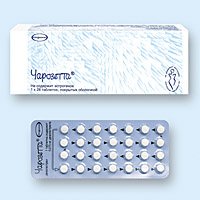 Oral contraceptives (OCs) or birth control pills are the most reliable and modern way to avoid unplanned pregnancies and many gynecological problems. At this point in time, experts offer two types of pills: contraceptives without estrogen and combination drugs that contain progesterone. The latter type of OC is considered to be the most effective and easier to take, however, there are situations when taking estrogen is contraindicated in a woman. In this case, the doctor prescribes the first type of OK. What kind of drugs, how to take them?
Oral contraceptives (OCs) or birth control pills are the most reliable and modern way to avoid unplanned pregnancies and many gynecological problems. At this point in time, experts offer two types of pills: contraceptives without estrogen and combination drugs that contain progesterone. The latter type of OC is considered to be the most effective and easier to take, however, there are situations when taking estrogen is contraindicated in a woman. In this case, the doctor prescribes the first type of OK. What kind of drugs, how to take them?
Progesterone is another hormone that the yellow bodies of the ovaries secrete. Its presence in the composition of modern means allows to suppress ovulation as efficiently as possible without causing a hormonal surge. That is why estrogen-free birth control pills are recommended for women and girls who:
- have estrogen dependent side effects;
- smoke;
- breastfeeding;
- have age over 35 years;
- suffer from hypertensive diseases;
- severe headaches or migraines;
- have excess weight or predisposition to his quick dial and other things.
 In pharmacies, you can find the tools of the past generation based on them. The mechanism of action of such drugs differs little from modern analogues. They affect the quality of cervical mucus (thicken it, which prevents sperm from entering the uterus), without actually affecting the processes of ovulation. These hormonal contraceptives without estrogens have lower reliability (87%) than modern drugs (98%).
In pharmacies, you can find the tools of the past generation based on them. The mechanism of action of such drugs differs little from modern analogues. They affect the quality of cervical mucus (thicken it, which prevents sperm from entering the uterus), without actually affecting the processes of ovulation. These hormonal contraceptives without estrogens have lower reliability (87%) than modern drugs (98%).
The new generation of OK has non-contraceptive merits. They allow you to improve the condition of the skin, carry out the prevention of colon cancer diseases, mammary glands, ovaries and reproductive organs. Reduce the risk of anemia and menstrual disorders.
The most popular and reliable drugs without estrogen
- Charozetta (CERAZETTE) is a new monophasic drug containing 75 µg of desogestrel.
- Microlut (MICROLUT) is a monophasic agent that contains 30 μg of levonorgestrel.
- Lactinet (LACTINETTE) is a special preparation of a new generation for nursing mothers (monophasic). Contains 75 mcg of desogestrel.
- EXLUTON (EXLUTON) is a modern monophasic pill consisting of 500 μg of linestrenol.
All contraceptives without estrogens, whose name is given, are highly effective means of protecting a woman from unwanted pregnancy and certain gynecological diseases.
Pills
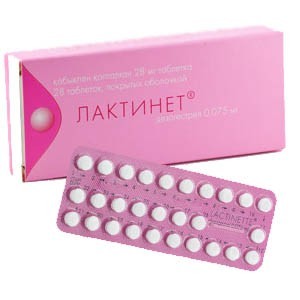 Modern birth control pills without estrogen are taken daily at the same time - without interruption. After the end of one pack of pills (28 pieces) you should buy the next one and immediately start taking it. If the reception mechanism is broken (the tablet is taken 10 hours or more after the prescribed time), then the effectiveness of the active component is reduced. Doctors recommend using other methods of protection in the next 3-4 days.
Modern birth control pills without estrogen are taken daily at the same time - without interruption. After the end of one pack of pills (28 pieces) you should buy the next one and immediately start taking it. If the reception mechanism is broken (the tablet is taken 10 hours or more after the prescribed time), then the effectiveness of the active component is reduced. Doctors recommend using other methods of protection in the next 3-4 days.
In addition to these advantages, these tools have some minor drawbacks:
- do not delay the reception;
- there may be (first 3-5 months) bleeding;
- gastrointestinal diseases such as diarrhea or vomiting may affect the effectiveness of drugs.
Before you start taking, you should consult with your doctor.
Many women are afraid to take birth control pills for fear of side effects. Innovative technologies allow the manufacture of contraceptive drugs containing the minimum amount of hormones and affecting exclusively the conception process.
pharmachologic effect
Contraceptive pills of the new generation contain a complex of progestogens and estrogens. These sex hormones inhibit the synthesis of gonadotropins (follicle-stimulating and luteinizing hormone) in the pituitary gland of the brain. As a result, the process of maturation of the egg and rupture of the follicle is blocked, so pregnancy cannot occur.
Oral contraceptives contribute to the thickening of cervical mucus, making it difficult for sperm to move and enter the uterus. After taking birth control pills, a secretory transformation of the endometrial layer occurs, even if spontaneous ovulation occurs, the egg fertilizes, the embryo cannot implant into the uterine wall.

Third-generation progestogens have a high affinity for progesterone hormone receptors, so they can bind to them and have a contraceptive effect, blocking ovulation and the release of FSH, LH. At the same time, progestogens with androgenic receptors have a low affinity, which reduces the risk of side effects such as male-type hair growth, acne, excess weight, hair loss, irritability, etc.
The contraceptive effect of the tablets is mainly provided by progestogens, estrogens support the proliferation of the inner layer of the uterus, control the flow of the menstrual cycle, replace the lack of estradiol, the synthesis of which is blocked along with ovulation. Due to synthetic estrogens, intermenstrual bleeding does not occur during the intake of modern contraceptive pills.
Depending on the composition of the active ingredients, COCs are distinguished - combined oral contraceptives containing progestogens + estrogens, and purely progestin contraceptive pills (mini-pill).
Taking into account the daily dosage of synthetic estrogen, COCs classify:
- High doses contain up to 50 mcg / day. ethinyl estradiol.
- Low-dose contraceptives include no more than 35 mcg / day. estrogen component.
- Microdosing tablets are distinguished by the smallest amount of ethinyl estradiol, not exceeding 20 mg / day.
High-dose hormonal contraceptives are used only for medicinal purposes and for emergency protection after unprotected sexual intercourse. Currently, preference is given to low and microdosing contraceptive preparations for the prevention of unwanted pregnancy.
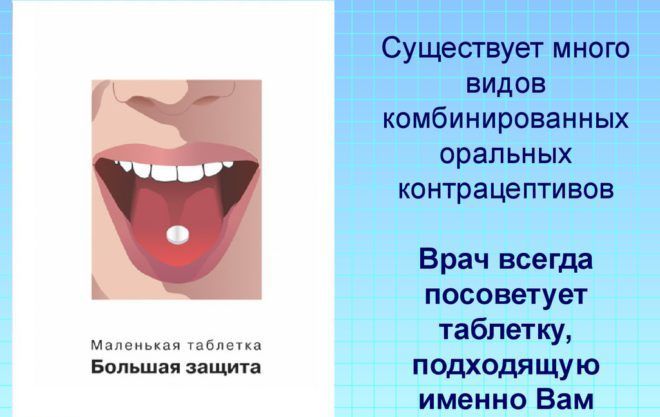
Depending on the combination of progestogens and estrogens, COCs share:
- Monophasic pills are characterized by a constant daily dose of both sex hormones.
- Multiphasic contraceptives differ in variable estrogen dosage. This creates an imitation of fluctuations in the hormonal balance in the woman's body during different phases of the menstrual cycle.
Tablets with a low content of hormones provide reliable protection against unplanned pregnancy (99%), are well tolerated, allow you to control the menstrual cycle. After discontinuation of COC, reproductive function is restored within 1–12 months.
In addition to contraceptive action, oral contraceptives are prescribed to treat premenstrual syndrome, dysmenorrhea, reduce blood loss during menstruation, hyperandrogenism, ovulatory pain, reduce the frequency of recurrences of inflammatory diseases of the genitourinary system. COCs reduce the risk of endometrial cancer of the uterus, ovaries, rectum, fibrocystic mastopathy, anemia, and ectopic pregnancy.
The pros and cons of taking COCs
The main advantages of taking the combined contraceptive pill include:
- high level of reliability - 99%;
- additional therapeutic effect;
- prevention of chronic diseases, cancerous tumors;
- rapid contraceptive effect of pills;
- protection from ectopic pregnancy;
- random reception of COC on early terms pregnancy is not dangerous;
- prevent the appearance of intermenstrual, dysfunctional uterine bleeding;
- contraceptives are suitable for long-term contraception;
- the ability to cancel the pill if you want to get pregnant;
- improves the condition of the skin.
After short-term use of combined oral contraceptives (3 months), the sensitivity of hormonal receptors in the ovaries increases, therefore, after the abolition of COCs, there is an enhanced stimulation of ovulation and the release of gonadotropins, the re-play effect. This method of therapy helps women suffering from anovulation to become pregnant.

The disadvantages of taking birth control pills include the high cost and possible side effects. Undesirable manifestations are rare (10–30%), mostly in the first few months. Later, the condition of women is normalized. The simultaneous intake of COCs and anticonvulsants, anti-tuberculosis drugs, tetracyclines, antidepressants reduces the therapeutic effect of contraceptives.
Common side effects include:
- irritability, aggressiveness, tendency to depression;
- migraine;
- swelling of the mammary glands;
- impaired glucose tolerance;
- weight gain;
- amenorrhea;
- chloasma - the appearance of age spots on the skin;
- acne, seborrhea;
- breakthrough bleeding;
- intermenstrual hemorrhages;
- thrombophlebitis;
- decreased libido;
- amenorrhea due to endometrial atrophy;
- increase blood pressure.
If the side effects do not disappear after 3 months of taking contraceptives, the tablets are canceled or replaced with other drugs. Such a complication as thromboembolism is extremely rare.
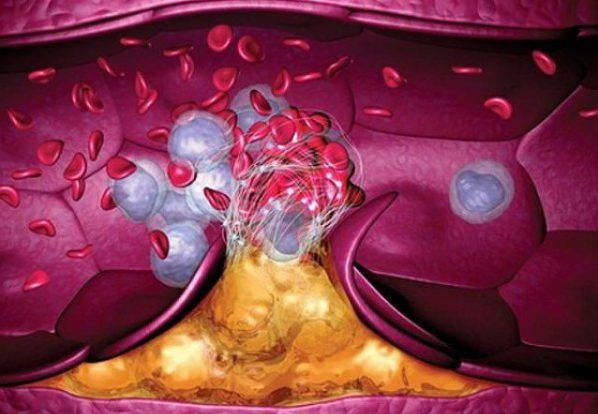
Indications and contraindications for taking COC
Combined oral contraceptives are suitable for women having a regular sex life, suffering from painful, heavy menstruation, endometriosis, benign breast tumors. Perhaps the appointment of birth control pills in the postpartum period, if the mother does not breastfeed.
Contraindications:
- thrombophlebitis;
- diseases of the cardiovascular system;
- diabetes;
- pregnancy or suspected conception;
- pancreatitis;
- inflammatory diseases, liver tumors;
- renal failure;
- lactation;
- uterine bleeding of unknown etiology;
- migraine;
- individual intolerance to existing components.
When pregnancy occurs, taking birth control pills should be urgently canceled. But if a woman drank the medicine after conception, there is no significant risk for the fetal development of the child.
COC regimens
Contraceptive hormonal pills are selected individually for each woman. This takes into account the presence of gynecological diseases, related systemic ailments, and possible contraindications.
The doctor advises the patient about the rules for taking COCs, conducts observation for 3-4 months. During this period, an assessment of the tolerability of tablets is carried out, a decision can be made to cancel or replace the contraceptive. Dispensary registration is carried out throughout the time of use of contraceptives.
First-line drugs include monophasic COCs containing estrogen not exceeding 35 mcg / day. and progestogens with weak androgenic effects. Three-phase pills are prescribed for primary or secondary estrogen deficiency, reduced sexual desire, dryness of the vaginal mucous membranes, menstrual disorders.
After the start of birth control pills, side effects may occur in the form of spotting, intermenstrual, breakthrough uterine bleeding caused by changes in hormonal levels. After 3 months, all symptoms should go away. If the malaise persists, replace the drug, taking into account the problems encountered.
Birth control pills are drunk daily at the same time. For convenience, the blister indicates ordinal numbers. Take COCs on the first day of the menstrual cycle and continue for 21 days. Then make a break for 1 week, during this period there is a withdrawal bleeding, ending after the start of a new package.
In case of skipping the next pill, you need to drink it no later than 12 hours. If more time has passed, the contraceptive effect of the drug will be lower. Therefore, over the next 7 days, you must use additional barrier means from unwanted pregnancy (condom, candles). Do not interrupt the reception of COCs.
![]()
Regimens
Schemes of prolonged administration of combined oral contraceptives for menstrual disorders:
- Short dosage of birth control pills allows you to increase the interval between menstruation by 1-4 weeks. Such schemes are used to delay spontaneous menstruation, prevent bleeding and cancellation after a course of oral contraceptives.
- Long-term dosing is prescribed to delay menstruation from 7 weeks to several months. Treatment with birth control pills is prescribed for anemia, endometriosis, polycystic ovarian disease, premenstrual syndrome, hyperpolymenorrhea.
Some women prefer cyclic KOK with a seven-day break due to fear of pregnancy, the development of infertility. Some patients believe that menstruation is a physiological process.
Popular combination oral contraceptives
Microdose tablets with low hormone levels:
- The median is a monophasic estrogen-gestagenic COC. The drug contains drospirenone, which has anti-mineralcorticoid effect, prevents the collection of overweight, edema, acne, oily skin, seborrhea.
- Jess contains ethinyl estradiol 20 mcg, Dospirinone 3 mg. Contraceptive drug is prescribed for contraception, for the treatment of severe acne, painful menstruation.
- Lindinet 20 tablets include ethinyl estaradiol 20 µg, gestodene - 75 µg. It is indicated for use in painful menstruation, with an irregular cycle, for contraception.
- Zoeli Active ingredients: estradiol hemihydrate - 1.55 mg, nomegestrol acetate - 2.5 mg. Nomegestrol acetate is a highly selective progestogen, having a similar structure to progesterone. The active ingredient has a weakly androgenic activity, does not have mineralcorticoid, estrogenic and glucocorticoid action.

Mini drank
Popular contraceptive pills with a minimum hormone content - mini-pills are an alternative contraceptive for women who are contraindicated for COC. The drugs included microdose progestin, progesterone analogue. One capsule contains 300–500 µg / day. The action of mini-pili is inferior to COC, but they have a milder effect, are recommended for women who have side effects after taking combined birth control pills.
Low-dose progestin drugs can be taken by the weaker sex during lactation, the active substance does not affect the taste of breast milk and does not reduce its volume. Unlike COCs, mini-pills do not cause blood clots, do not contribute to thrombosis, increase blood pressure, and therefore allowed for use in cardiovascular pathologies, thrombophlebitis.
Contraceptive progestin tablets do not affect ovulation, they thicken cervical mucus, preventing sperm from entering the uterus and ovaries. In addition, the peristalsis of the fallopian tubes slows down, proliferative changes of the endometrium occur, which does not allow the embryo to be implanted in the event of fertilization of the egg. When taking gestagen preparations, the menstrual cycle and regular bleeding are preserved.
The contraceptive effect is achieved 3-4 hours after taking the pill and persists for a day. Mini-pili provide 95% protection against unplanned pregnancy.
Mini-drinking rules
Before using contraceptives, women should be examined by a gynecologist to rule out pregnancy and chronic diseases of the reproductive system. To get the desired result, you must strictly follow the rules for using mini-saws:
- Taking pills start from the first and continue until the 28th day of the menstrual cycle, drink them continuously at the same time. Skipping the next contraceptive intake for more than 3 hours completely eliminates the contraceptive effect.
- During the first few weeks, nausea may be a concern, usually this symptom gradually subsides. To reduce discomfort, it is recommended to take a pill with food.
- If, after taking a mini-drink, vomiting has opened, the pill needs to be drunk again as soon as one feels normal. This recommendation also applies to diarrhea. In the next 7 days, you must use additional contraceptives (condoms) to protect against unwanted pregnancy.
- When switching from COC, you should drink mini-drinks immediately after the end of the package of combined contraceptives.
- Pregnancy may occur in the first month after the abolition of progestin tablets. Ovulation occurs after 7–30 days (an average of 17) at the end of the 56-day course.
- Women prone to the appearance of pigment spots (chloasma) after exposure to the sun should avoid prolonged exposure to ultraviolet radiation.
- While taking mini-pills and barbiturates, activated carbon, laxatives, anticonvulsants, Rifampicin, the effectiveness of contraceptives becomes less.
- In the postpartum period, progestin contraceptives are prescribed on the first day of the onset of menstruation, but not earlier than 6 months after the birth of the child.
- After the abortion, the pills begin to drink immediately after the operation; no additional contraception is required.
- The contraceptive effect of the mini-pili is weakened if the skip between taking the next contraceptive pill is more than 27 hours. In the case when the woman forgot to drink the medicine, it is necessary to do this as soon as possible and in the future strictly follow the treatment regimen. During the next week, you need to use additional means of protection against pregnancy.

Contraindications
It is contraindicated to take oral contraceptives with a low dose of hormones during pregnancy, with uterine bleeding of unexplained etiology, liver diseases, steroids, exacerbation of herpes, liver failure. You can not drink pills, if previously there were ectopic pregnancies, when malignant tumors of the mammary glands were detected or suspected. A contraindication is lactose intolerance, glucose-galactose malabsorption.
Reducing the effectiveness of contraceptives can be observed in violation of the rules of admission, use of laxatives, barbiturates, anticonvulsants, after vomiting, diarrhea. Irregular menstruation may appear on the background of progestin tablets. In such cases, it is necessary to stop taking the mini-drink, exclude possible pregnancy (including ectopic), and only then resume the course.
Side effects of birth control pills
Mini-pills have fewer side effects than COCs. The negative effects of taking birth control pills include:
- vaginal candidiasis (thrush);
- nausea, vomiting;
- intermenstrual bleeding;
- contact lens intolerance;
- swelling of the mammary glands, discharge from the nipples;

- contraceptives cause weight gain;
- the appearance of chloasma;
- urticaria, erythema nodosum;
- headache;
- acne;
- breakthrough bleeding while taking drugs that affect the liver;
- decreased libido;
- ovarian follicular cyst;
- amenorrhea, dysmenorrhea.
Mini-pills can increase insulin requirements in diabetic patients. Therefore, before taking birth control pills, it is necessary to consult with an endocrinologist and, if necessary, correct the dosage of hypoglycemic agents. Women should constantly monitor their blood sugar levels during the first month of taking mini-drank.
In rare cases, the use of progestin drugs can trigger the development of thromboembolism. It should be borne in mind that in women older than 40 years, the risk of the formation of breast cancer increases during treatment with hormonal drugs. If serious side effects appear, mini-pills are canceled.
If after the onset of pregnancy there was an accidental intake of contraceptives, there is no risk to the fetus, but the further course of the pills should be canceled. At high dosages of progestogens, masculinization of the female embryo can be observed. During lactation, part of the active ingredients of the drug penetrates into breast milk, but its taste does not change.

Popular mini-pili
- Femulen (ethynodiol).
- Exluton (lynestrenol 0.5 mg).
- Charozetta. The active substance - desogestrel in the dosage of 75 mg. Tablets do not cause significant disorders of carbohydrate, lipid metabolism, hemostasis indicators.
- Microlut (levonorgestrel 0.03 mg).
- Continuin (ethynodiol acetate 0.5 mg).
The disadvantages of using progestin contraceptive pills include the possible formation of ovarian follicular cysts, menstrual disorders, edema, weight gain, irritability. The contraceptive effect of mini-pili is lower than that of KOC, 90–97%.
Modern contraceptive drugs contain small doses of hormones, to a lesser extent provoke the development of side effects, provide reliable protection against unplanned pregnancy. Assign pills to the attending physician, taking into account the individual indications of women. The patient should be at the dispensary during the entire period of KOC or mini-pili. Especially careful control is carried out within the first 3-4 months from the beginning of use of oral contraceptives.

Yadashko V.I., Sokhin F.A. (ed.) Preschool pedagogy - file n1.doc
Registration by balloons of birthday and anniversary
What drugs can cause abortion
Content corner for parents in kindergarten
How to see who is looking for you in "wait for me"